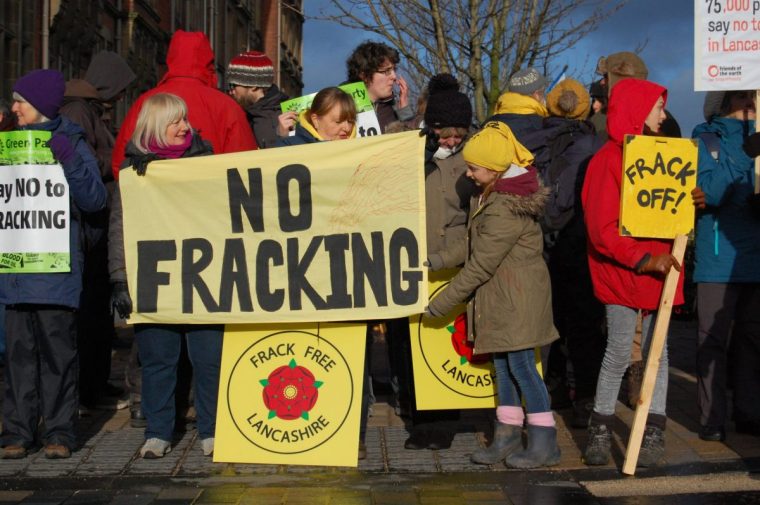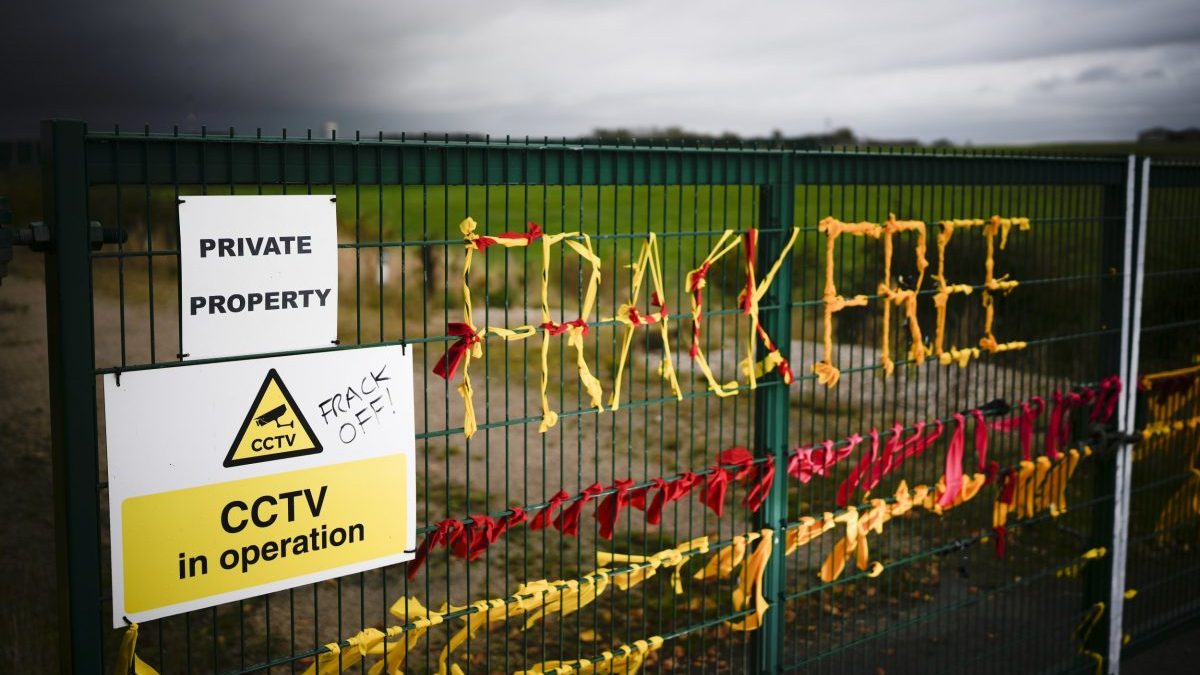Oil and gas companies are laying the groundwork for a Reform government that has pledged to bring back fracking, but it is already causing tension within the party
In 2019, a 2.9 magnitude earthquake was recorded on the Fylde Coast in Lancashire near the UK’s first horizontal fracking site.
The tremor led to fracking being effectively banned in England. It followed years of impassioned protests by environmentalists and local communities, which had already put the practice of drilling deep into the ground for fossil fuels on hold in other parts of the UK.
Now Reform is reopening the controversial fracking debate by pledging to introduce new licences as part of its “drill, baby, drill” energy policy.
New FeatureIn ShortQuick Stories. Same trusted journalism.
But it is causing friction within the party. The aftershocks of the earthquake still linger in Lancashire, where local Reform councillors are distancing themselves from the pledge.
In other parts of the country, though, Reform leaders are embracing the idea and have been meeting with oil and gas firms that are already laying the groundwork for a Nigel Farage-led Government.
But outside of any possible party infighting, Reform risk putting off voters. Fracking will be “fiercely fought” within some communities concerned about the impact on the environment, warned one campaigner.
Which parts of the country face fracking under Reform?
Fracking is the name of the method used to extract energy from shale rock, a form of matter buried deep in the ground, which contains small gaps that store gas. The process involves drilling into the rock and fracturing it to release the gas.
It is controversial because it can cause earth tremors and does not align with the UK’s plans to phase out fossil fuel use as part of its climate change targets. But proponents say it will make the country more energy secure and less reliant on gas imports.
The fracking moratorium in England was temporarily lifted under former Prime Minister Liz Truss in 2022, before being quickly reinstated by her successor, Rishi Sunak, before any drilling took place.
The current Labour Government has pledged to ban fracking by changing the law, which is one step further than the current moratorium under which the Government has not issued any new licences. If Labour does this, it means Reform, should it get into power, will need to change the law again to reintroduce fracking.
Shale gas has been found in four parts of the UK, the largest of which is known as the Bowland–Hodder area and covers large swathes of Lancashire, Yorkshire and the Midlands.
The other areas include the Jurassic Weald Basin and Wessex area in the South of England, as well as the central belt of Scotland.
Before the fracking moratorium, the Fylde Coast was the main battleground between fossil fuel firms and the environmentalists who opposed them.
In 2016, energy company Caudrilla was given permission for test drilling at a site near Blackpool. Environmental groups established a semi-permanent encampment at the site and protested the drilling until the moratorium was introduced in 2019.
 People demonstrating outside the council offices of Lancashire County Council in Preston in January 2015 (Photo: Jonathan Nicholson/NurPhoto/Getty)
People demonstrating outside the council offices of Lancashire County Council in Preston in January 2015 (Photo: Jonathan Nicholson/NurPhoto/Getty)
Local Reform councillors in Lancashire have been quick to distance themselves from the party’s official policy of wanting to bring back fracking.
Despite their protestations, Reform’s deputy leader, Richard Tice, has refused to rule it out in Lancashire – a sign of tensions heating up within the party.
Simon Evans, the deputy leader of Lancashire County Council, told the BBC the Fylde Coast was “not conducive to fracking, and there are no plans for it to take place here”.
County councillor Joshua Roberts said fracking “has a place when safety is proven but it has been proven in Lancashire not to be safe”.
Fracking moves east
This time around, oil and gas firms have set their sights on the eastern side of the Bowland-Hoddar area, which covers parts of Lincolnshire, Nottinghamshire and Yorkshire.
Egdon Resources, a gas exploration company owned by Texan energy firm Heyco, is hoping to exploit a gas field surrounding the Lincolnshire market town of Gainsborough.
In February, Heyco’s chief executive, George Yates, was invited to speak at an energy conference in Lincoln organised by Lincolnshire County Council.
Mark Abbot, chief executive of Egdon Resources, told The i Paper that Yates “presented a summary of the results of a report commissioned by Heyco from Deloitte on the economic and environmental opportunity that extraction of shale-gas from the Gainsborough Trough represents for the UK”. The report by Deloitte has not been made public.
Egdon Resources has also met with Reform politician and Mayor of Greater Lincolnshire Andrea Jenkyns, who has spoken favourably of fracking, arguing that it will bring jobs and energy security to Lincolnshire.
Abbot said the firm “meets with representatives of all political parties that will engage with us to make the case for indigenous energy production”.
Another gas exploration company, Star Energy, has been meeting with Reform councillors in Lincolnshire to discuss the area’s potential for fracking.
Councillor Danny Brooks told The i Paper that Star Energy had provided information on where in Lincolnshire is “suitable” for fracking.
“You’ve got to be careful where you put it, but I think on the whole it’s a good thing,” he said, adding that firms would also need the “community on board” to go ahead.
Star Energy chief executive Ross Glover said there is a “world-class shale resource” in Nottinghamshire and Lincolnshire “that this country should at least investigate”.
He said Star Energy employs 65 people in the region as part of its traditional oil and gas activity and has met with representatives from other parties alongside Reform.
Other areas that could see fracking include Yorkshire and parts of Kent, Sussex and Hampshire.
Reform’s attack on net zero
 Reform UK leader Nigel Farage has told energy firms to get ready to ‘drill, baby, drill’ if it gets into Government (Photo: Peter Nicholls/Getty)
Reform UK leader Nigel Farage has told energy firms to get ready to ‘drill, baby, drill’ if it gets into Government (Photo: Peter Nicholls/Getty)
The plans to bring back fracking fits into Reform’s wider energy policy, which includes maximising fossil fuel production and ending subsidies for green energy.
Reform has pledged to reverse the current Government’s ban on new oil and gas drilling in the North Sea, promising to grant new licences on “day one” of getting in power.
Reform and fossil fuel firms argue the UK must maximise oil and gas production for the country’s energy security.
However, the UK has signed up to international agreements to phase out fossil fuels as part of the global fight to slow climate change.
But the location of the UK’s gas reserves could pose a political challenge for Reform if local people oppose new drilling in droves.
An analysis by Greenpeace’s Unearthed identified 127 constituencies across England and Wales where fracking licenses were issued in the years before the ban. Over a quarter (34) were seats where Reform came first or second at the last election.
YouGov polling from earlier this year showed that 51 per cent of voters are opposed to fracking, while 24 per cent are supportive and 25 per cent are unsure.
Reform voters tend to be more in favour of fracking, with 43.2 per cent opposed to ending the practice, according to recent polling. However, this number drops to 36.5 per cent for “Reform curious” voters.
Mike Jordan, a Reform councillor for North Yorkshire Council, said he was “half in favour” of fracking.
“If it can be done safely and properly. I don’t see any problem with it. The issue is obviously we’re not like the American states where they’ve got vast areas where it can be done literally hundreds of miles away from any other houses,” he said.
Environmental groups get ready
Environmentalists in Lincolnshire are already gearing up for a fight if Reform grants fracking licences in the region.
“Fracking was fiercely fought in the west of the country and it will be fiercely fought if they try and bring it anywhere else,” said Amanda Suddaby from the group SOS Biscathorpe, which has spent years fighting plans by Edgon Resources to drill for oil in Lincolnshire.
Suddaby said fracking would be fought locally due to “traffic, earthquakes, air pollution, water pollution and the huge amounts of water that are required for fracking”.
“But there’s also the global implications; we are in a climate crisis and this is completely the wrong way of travel,” she said.
“It just doesn’t work on any basis other than for people who have vested interests in that industry.”

